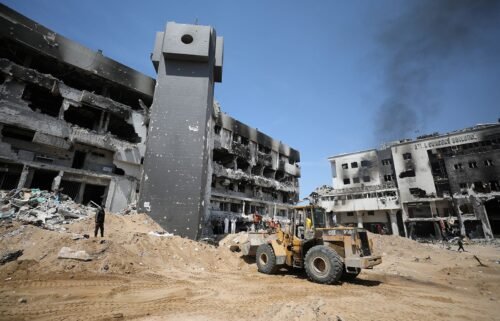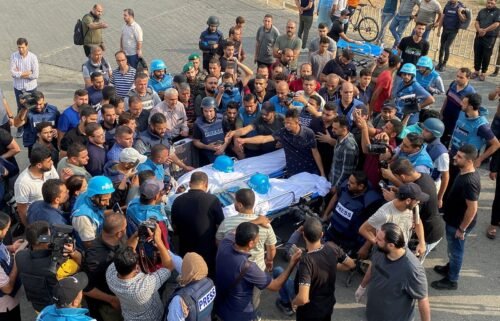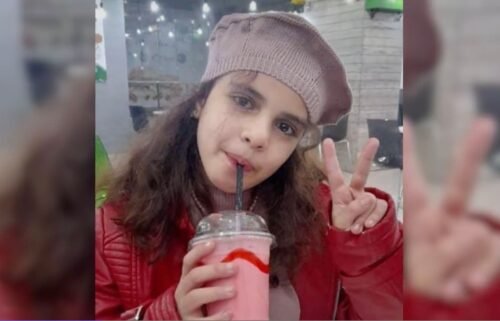‘I envy people who have a grave to visit’: Earthquake survivors in Turkey struggle to rebuild their lives one year on
Southern Turkey (CNN) — Five days after a devastating earthquake struck southern Turkey and northern Syria last year, the world witnessed a miracle: Sezai Karabas and his 6-year-old daughter Sengul were pulled out of the rubble of his collapsed apartment block in Gaziantep province without a scratch.
He may have looked like the luckiest man on earth, but he didn’t feel that way. His wife Rukiye and 4-year-old son Mehmet had died.
“On one hand you feel happiness, on the other, you feel sadness. I didn’t know if they made it out, but deep down I knew they probably hadn’t,” Karabas said. As he tried to explain his miraculous survival to CNN, Sengul played with her cousin atop the partially cleared rubble of their former home in the city of Islahiye.
They survived by pure luck. They were in another room grabbing winter coats when the building collapsed, he said – trapping them up under five stories of rubble in a long, meter-high pocket. After four days buried, he heard rescuers working above him, but said he didn’t shout because he knew they wouldn’t hear him. They were rescued a day later, after 132 hours.
“Even we don’t know how we survived,” Karabas said. “It was cold, we had no food, or water, but God gave us strength. We didn’t feel hunger, thirst or exhaustion even for a minute. We just waited, and tried to conserve energy.”
They have since moved to their family village and built a new house.
“Our relationship has become more intense. Of course, Sengul loved me before but now she doesn’t want to leave my side,” Karabas said.
Sengul doesn’t talk about her mother and brother, he added, not wanting to relive the traumatic memories of the earthquake.
Living in ‘container cities’
The initial earthquake on February 6 was 7.8 in magnitude; a second, 7.5 magnitude quake came hours later. The shaking lasted for only seconds but, a year on, it’s clear the impact will be felt for generations.
Parts of Hatay look almost like the earthquake happened yesterday, as badly damaged buildings await demolition. In the center of the ancient city of Antakya, there are few signs of life and even fewer buildings that look like anyone still lives in them.
According to official figures, 14 million people in Turkey were impacted by the earthquake. More than 850,000 housing units were either destroyed or badly damaged. And while most of the rubble has been cleared away, rebuilding is slow.
Last year, Turkey’s President Recep Tayyip Erdogan pledged to build 650,000 housing units for those who had lost their homes to the quake – 319,000 of them within a year.
His government promises that 75,000 will be finished in the next two months, but fewer than 20,000 have been fully completed so far.
The main roads between affected cities in southern Turkey are dotted with hundreds of temporary “container cities” that will be permanent for the foreseeable future. Almost 700,000 survivors still live in these camps – in trailers equipped with water and power, but little else.
Ismail Demir lives in one outside Islahiye, in Gaziantep province, with his pregnant wife and 1-year-old son. With arms outstretched, you can almost touch both walls. They have a space heater for warmth and a hot plate to cook. Because demand for housing far outstrips supply, he can’t afford to rent an apartment on his salary as a factory worker.
“Until (the government) gives us an apartment, we will have to stay here,” he said. the family lived in a rented apartment before the quake destroyed their home.
Search for the missing
Last year’s earthquake killed more than 50,000 people in Turkey, and thousands more in neighboring Syria. It is difficult to get accurate information on the recovery efforts in Syria, but there is scant evidence of a large-scale coordinated effort to rebuild.
In Turkey, even a year later, there are at least 145 people missing, 38 of whom are children, according to Sema Gulec, who leads DEMAK, a group formed to represent their families. The group’s calls for a commission to find the missing have now twice been rejected by parliament.
Gulec’s 25-year-old son, Batuhan, is among those who are missing. His building in the seaside city of Iskenderun collapsed on February 6. For eight days, Gulec and her family helped search the rubble. Survivors were pulled out, bodies were found, but not Batuhan.
Weeks later, a woman responded to social media appeals for information saying she saw Batuhan on February 6 – covered in dust, but alive. She said an ambulance was too full to take him, so instead he was put into a white car. Gulec has never tracked down the driver.
DNA tests have failed to confirm a match with any unidentified bodies. She knows he is likely dead, but she can’t let go of the tiny bit of hope fed by the lack of certainty over his fate.
“Sometimes at night, I imagine him coming to my apartment and ringing my doorbell, and I take him inside and I feed him,” she says. “If I can’t find his body, then I will be waiting for him my whole life.”
Cigdem Nur’s brother Mehmet, his wife and their six-year-old daughter are also missing. She said they bought their apartment because it was newer, and thus more likely to withstand an earthquake. It didn’t. Nur has checked body bags, searched hospitals, morgues and cemeteries, and looked in orphanages for her niece. She’s never found any trace.
“Can you imagine longing for a tooth or a nail? This is what I am longing for,” she told CNN, tears streaming down her face. “I envy people who have a grave to visit. I visit the grave of my brother’s friend to cry, pretending it’s my brother’s.”
She says the builder is in jail pending trial. According to Turkey’s justice ministry, 267 builders have been convicted since the earthquake so far for building code violations.
The earthquake-affected region was home to almost half of the 3.6 million Syrian refugees hosted by Turkey.
Khaled Kassar, from the Syrian city of Homs, was trapped with his wife and three boys under the rubble for five hours in Antakya, Hatay province, before they were rescued.
“It was a miracle,” he said.
He recalls how for months afterwards his boys refused to sleep inside, fearing collapse. The family recently moved to a small studio apartment in relatively undamaged Gaziantep city. But because of Turkish law requiring Syrian refugees to remain in the province in which they were initially registered, his sons have been turned away from the local schools, Kassar said. Administrators instead suggested they return to Hatay to enrol. His former home there is now an empty lot.
His boys spend their days at home watching TV and trying to study a little too. His son Anwar, 7, is a year behind in school. Jamal, 10, is two years behind.
“My god, I worry a lot. The last school year was wasted, this year was wasted and I don’t know what will happen with them. I came here from Syria for my kids,” Kassar said.
There is no official data on the number of Syrian children unable to register in school in Turkey, but Mustafa Kara Ali estimates it’s in the tens of thousands. He runs Kids Rainbow, a non-profit based in a center off a Gaziantep alley offering support, Turkish lessons and other activities to keep kids off the streets and prepared for school – when or if they are able to enrol.
They organization helps 120 children, but has a waiting list of more than 500 children who are either working in informal jobs or just sitting at home all day.
“If we have that many kids on our waiting list, as one center in one small neighborhood, imagine how many there are across the city, or across the country. It’s a huge problem and the Turkish government should solve it,” he said.
CNN has reached out to the Interior Ministry for comment.
Preparing for future quakes
Turkey’s government, led by Erdogan, came under sharp criticism in the aftermath of the earthquake for a slow emergency response and late mobilization of rescue teams. More broadly, the government was blamed for lax enforcement of building codes and delays in renewing building stock in a country prone to tremors.
The criticism was most acute in Hatay, where the opposition CHP controls the main city municipality. The government has, in turn, brushed off the criticism and at times accused the main opposition of incompetence that has hindered reconstruction that seems to be progressing more quickly elsewhere.
The weekend before the anniversary, Erdogan made a trip to the area, inaugurating two new hospitals in Hatay. One of the slogans for the trip was “We have turned the catastrophe of the century into the unity of the century.” The next day, Erdogan was campaigning for his party’s local mayoral candidate.
Erdogan suggested that cooperation would only come when local governments are controlled by his ruling Justice and Development Party (AKP). “If the local administration and the central government do not collaborate, if they are not in solidarity, nothing will come to that city. Did it come to Hatay? Right now, Hatay became lonely,” he said.
In Turkey’s largest city, Istanbul, Mayor Ekrem Imamoglu has complained about a lack of cooperation with Erdogan’s national government hampering preparations for future earthquakes.
Istanbul has long been keenly aware of the danger it faces. A 7.4 magnitude earthquake in northwest Turkey in 1999 killed more than 17,000 people. Its epicenter was in Istanbul’s neighboring Kocaeli province. An epicenter closer to the city would be much more catastrophic.
At a press conference last week, Imamoglu laid out the sobering statistics. The city estimates that two-thirds of Istanbul’s buildings were built before the 1999 earthquake, after which stricter building codes came into effect. Some 200,000 buildings will not withstand the next major earthquake and are in urgent need of either replacement of reinforcement. Three million people live in those buildings. City efforts have barely made a dent in the numbers.
When asked by CNN why private building owners are shouldering more of the burden, the mayor blamed Turkey’s economic troubles. “Banks can’t give loans, interest rates are too high and cost of construction is changing on a regular basis. People think they can’t manage this,” he said.
Many people either don’t know – or don’t want to know – that their building is at risk. Imamoglu added that city inspectors are often rejected by homeowners fearing the uncertainty – though this is less often the case since last year’s earthquake.
The-CNN-Wire
™ & © 2024 Cable News Network, Inc., a Warner Bros. Discovery Company. All rights reserved.



